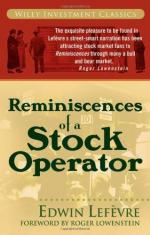
|
| Name: _________________________ | Period: ___________________ |
This test consists of 15 multiple choice questions and 5 short answer questions.
Multiple Choice Questions
1. Why did Livingston refuse the offer of partnership with Percy?
(a) He didn't like Percy's methods.
(b) He doesn't like being involved in cotton.
(c) He thinks Percy is on the illicit side of manipulations.
(d) He works alone.
2. What does Livingston think is his best guide to trading?
(a) What happens in Washington D.C.
(b) Himself.
(c) Standard and Poor's index of stock.
(d) The Fortune 500.
3. For what does young Livingston have an excellent memory?
(a) Recipes.
(b) Numbers.
(c) Languages.
(d) People's names.
4. What did Livingston do about individual stocks?
(a) Made charts of their ups.
(b) Paid absolutely no attention to them.
(c) Followed them carefully.
(d) Stopped focusing on them.
5. What should one decide to do in order to make money?
(a) Let a financial advisor handle your deals.
(b) Hold on to the stock until it starts to drop.
(c) Sell when you need money.
(d) Stay in for the long haul.
6. In what does Livingston trade besides stocks?
(a) Bonds.
(b) Mutual funds.
(c) Commodities.
(d) Index funds.
7. Where is Livingston trading at the start of Chapter V?
(a) Desmond & Rafferty's.
(b) Charles Tantion's.
(c) He's self-employed.
(d) Fullerton's.
8. According to Livingston why should no one trade every day?
(a) The excitement leads to mistakes.
(b) It cost too much money.
(c) It is too tiring.
(d) It's not good for the soul.
9. Why do the bucket shops begin banning Livingston?
(a) He wins too much.
(b) He is obnoxious.
(c) He has stolen money.
(d) He runs other customers away.
10. What has happened to Percy recently in the market?
(a) He caused the market to go into a slide.
(b) He made millions.
(c) He had withdrawn from the market.
(d) He lost millions.
11. What did Livingston decide to look at when thinking about what to buy or sell?
(a) Mutual funds.
(b) The ten best stocks.
(c) Index funds.
(d) The overall market.
12. What does experience give a successful stock trader?
(a) Respect.
(b) Learning.
(c) A job.
(d) Friends.
13. Why is Livingston so good at betting?
(a) He has a good poker face.
(b) He is clairvoyant.
(c) He uses only the simple stocks.
(d) He can remember the patterns.
14. How does Livingston portray himself to the small exchanges?
(a) Someone who is very, very wealthy.
(b) Someone who has lost a lot of money on Wall Street.
(c) Someone who is very knowledgeable.
(d) Someone who has never thought about stocks.
15. Why does it take Livingston so long to understand how to trade?
(a) He won't listen to his mentor.
(b) He enjoys it so much he doesn't pay attention.
(c) He is too confident in his own methods.
(d) He hates to study hard.
Short Answer Questions
1. What does Roberts suggest to Livingston?
2. Where does Livingston get his money to start to recoup his losses?
3. When can one only sell stock?
4. What does Percy believe about the cotton market?
5. Why is corn having a hard time getting to the market?
|
This section contains 529 words (approx. 2 pages at 300 words per page) |

|




